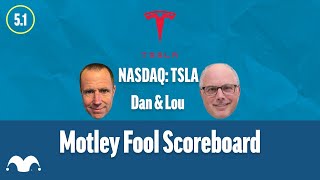Last month, New Jersey lawmakers voted to block Tesla Motors (TSLA +3.47%) from selling its fleet directly to consumers. Why is Tesla's direct sales model so intimidating to auto dealers, and are the dealers' complaints valid?

Source: Tesla
Old school
There used to be one way to learn about and buy cars -- go to the car lot, ask all the questions you can think of, kick the tires, haggle, haggle some more, and then drive away huffing that new car smell while trying to get past the nagging feeling that the dealer just pulled one over on you. Back then, dealerships had exclusive access to all the facts and figures a customer would need to make an educated purchase. Of course, they also provided other necessities like test drives and maintenance. Most importantly, though, dealers always had the upper hand; they were the only real source of information about a brand's fleet for potential car buyers.
New school
Fast-forward to today when consumers walk in to dealerships armed to the teeth with price data and competitor's offers. Most folks nowadays have done extensive research and will walk into a dealership looking to test drive a specific car, get a rock bottom price, and get out. Consumers are becoming accustomed to the ease of shopping and finding the best price possible online, thereby leaving them with little patience for the iconic runaround from the salesperson.

Source: Tesla
Tesla has recognized this fundamental shift and chose to implement a direct sales model, by which customers purchase directly from the company, omitting dealers all together. Tesla argues that this model affords potential car buyers a compelling and dynamic purchasing experience. The National Automobile Dealers Association, or NADA, and certain states assert that this direct sales model undermines dealerships; it is illegal in Texas, Arizona, and New Jersey.
Franchised dealerships have three main complaints when it comes to the direct sales model, each of which can be addressed with just a bit of logic.

Source: Tesla
Dealer tantrum No. 1: territory encroachment, or the holdup problem
Dealers are intimidated by the prospect of their manufactureing partners moving into their dedicated territory, thereby reducing the brick and mortar's profitability. This fear of being held up by their partners doesn't follow logically, as manufacturers and dealers alike rely upon brand reputation. Moving in on a well-established local dealership would tarnish the manufacturer's reputation as a loyal and supportive franchise partner.
Dealerships are vital allies to traditional manufacturers as they are a one-stop shop that honors warranties, addresses recalls, and provides test drives. Moving in on established territories would both alienate established dealers, thus discouraging them from selling that manufacturer's brand, and would make developing new dealerships a challenge, thereby cutting into the carmaker's brick and mortar profit.
Secondly, the old school model of car sales is well entrenched in our society, one could say that it's a right of passage, and it's not going to go anywhere anytime soon. Seeing as the majority of car purchases take place on a dealer's sales floor, it is up to manufacturers to find a way to balance the new school with the old. If an equilibrium isn't found, carmakers could lose out on both the well-established brick and mortal market and on the up and coming direct sales market.

Source: Tesla
Dealer tantrum No. 2: the free-rider problem
Dealerships are concerned about being adequately compensated for the services that only a physical location can offer, like the aforementioned honoring of warranties, test drives, and recall remediation. This "free-rider" problem is based in the fear that dealers would be working for free by providing all the pre- and post-sale services without getting the actual sale and commission. Manufacturers could easily address this by providing percentage-based compensation for every direct sale that is made in a specific dealer's territory.
Dealer tantrum No. 3: Who will defend the consumer from the big bad manufacturer?
Dealers insist that the direct sales model would put consumers at the mercy of manufacturers. Without a dealer to advocate for the customer, they argue, the manufacturer will jack up the price. This is faulty logic, as the franchise sales model forces the customer to walk in to a franchise dealership and do their best to match wits with a seasoned salesperson, who has the upper hand.
Dealers are doing their best to meet sales and inventory quotas. Since the majority of these salespeople rely on commission there is an obvious conflict of interest. Why would a commission-based salesperson fight for the lowest price? They wouldn't. Dealers are anything but advocates for consumers; in fact, it's part of their job to upsell until the customer caves.

Source: Tesla
But wait, they might have a point
NADA and the like have one valid point in presenting the concern that if a direct sales carmaker, like Tesla, goes under, then the consumer will be left out in the cold, with no one to honor warranties or provide maintenance. The fault with this logic is that it stands true for any manufacturer, not just Tesla. This is a contingency not specific to any one carmaker; all manufacturers have to prepare for this risk.
The future is now
Traditional franchise-based sales have their place, and likely always will, but that doesn't negate the importance of the new wave of consumers who would like the choice to buy directly from the manufacturer of their choosing. The growing demographic that wants the Tesla experience is likely to prove crucial in the adoption of Tesla's third-generation electric vehicle. Tesla shareholders, and potential investors, will have to consider the implications of this debate about old and new sales models -- how it plays out state by state will change how the vehicles in Tesla's fleet are sold and delivered. Direct sales litigation is a slippery slope that investors should watch with a keen eye.






